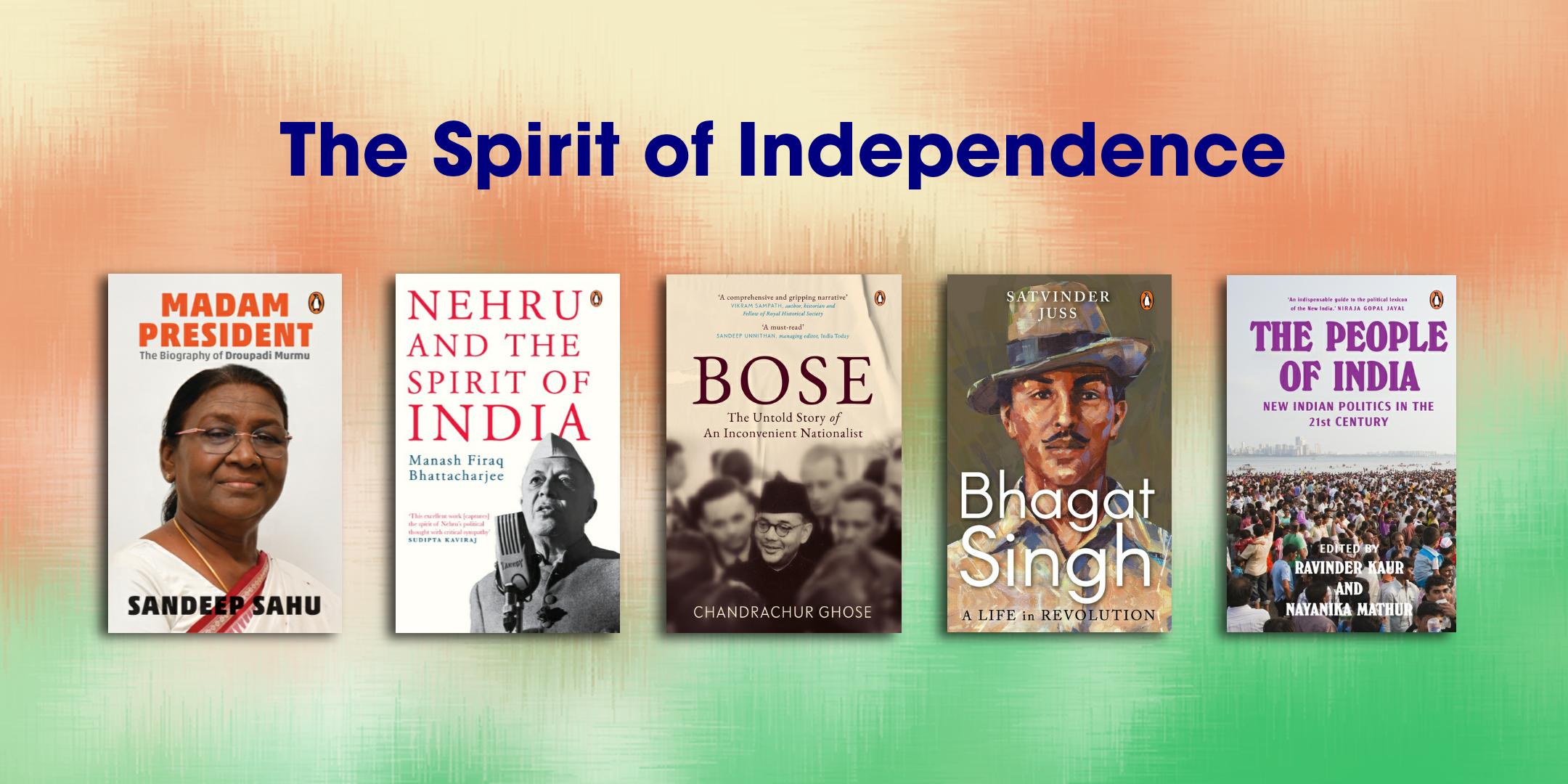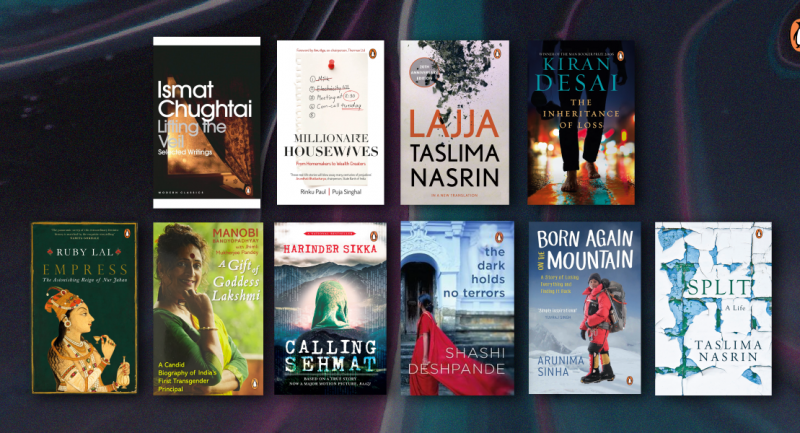
Celebrate this Independence Day with a diverse and thought-provoking collection of books about India that will lift up your patriotic spirits. From riveting biographies of influential leaders to insightful accounts of India’s formative years, these books offer a window into our great nation and the visionaries who shaped its destiny.
Take a look!

Madam President is the first-ever comprehensive and authentic biography of Droupadi Murmu, the fifteenth President of India, by senior journalist Sandeep Sahu. Murmu’s long and eventful political journey is a story of true perseverance and inspiration. Having battled early years of struggle in securing quality education, being struck by a series of personal tragedies such as the loss of her husband and two sons in quick succession,
and suffering electoral victories and losses, Murmu has risen through her circumstances with grace, fortitude and resilience that make her the well-revered leader she is today.

The first decade after India’s independence, 1947-1957, was probably the most crucial in the nation’s history. Opening a window to this period, this book weaves a story out of the complex ideas and events that have largely remained beneath the surface of public discourse. The transfer of power, the framing of the Constitution and the formation of the governance machinery; the clash of ideas and ideologies among parties and personalities; the beginning of the disintegration of the Congress and the consolidation of political forces in the opposition; Nehru’s grappling with existential problems at home and his quest for global peace; the interplay between democratic ideals and ruthless power play-all these factors impinged on each other and shaped the new republic in its formative decade.

From the stories of figures like Manmohan Singh and Muhammad Ali Jinnah, to Gauri Khan’s grandmother and Avtar Narain Gujral, Scars of 1947 is a moving and nostalgic collection of a journey back in time, of an unforgettable period that left two nations scarred forever.

The Indian Supreme Court was established nearly seventy-five years ago as a core part of India’s constitutional project. Does the Court live up to the ideals of justice imagined by the framers of the Indian Constitution? Critics of the Supreme Court point out that it takes too long to adjudicate cases, a select group of senior advocates exercise disproportionate influence on the outcome of cases, the Chief Justice of India strategically assigns cases with an eye to outcome, and the self-appointments process-known as the collegium-is just another ‘old boy’s network’. Building on nearly a decade of original empirical research, Court on Trail examines these and other controversies plaguing the Supreme Court today. The authors provide an overview of the Supreme Court and its processes which are often shrouded in mystery, and present data-driven suggestions for improving the effectiveness and integrity of the Court.

Middle of Diamond India proposes a revolutionary idea – that India has long ignored its largest and most talented segment, citizens in the Tier 2 and Tier 3 districts, its Middle.
The book reveals the hidden stories of those in its Middle who have been ignored owing to their location and language. By examining India’s revolutionary past, its culture, its citizens, its innovators, and its spirit, the book illuminates this Diamond shaped India.

As a second-generation refugee, Bhattacharjee argues for a ‘minoritarian’ approach to national politics. Breaking ideological and disciplinary protocols, he compels us to learn from the insights of poets and thinkers. Lucidly written, Nehru and the Spirit of India book offers an original perspective on Nehru and Indian history.

Jawaharlal Nehru wrote the book ‘The Discovery of India’, during his imprisonment at Ahmednagar fort for participating in the Quit India Movement (1942 – 1946). The book was written during Nehru’s four years of confinement to solitude in prison and is his way of paying an homage to his beloved country and its rich culture.

A timely antidote, Bhagat Singh, A life in Revolution meticulously researched biography is an expansive foray into the life of Bhagat Singh. The volume deliberates upon his family from before when he was born, examining along the way the role that various episodes, policies and people played in shaping the identity of a legendary revolutionary, while also delving into his opinions on important questions of the time. It shines a bright light on the oft-ignored personal influences that made Singh who he was, along with the issue of his contested identity in today’s politics. This is the definitive Bhagat Singh biography of our times.

Narrating the tales of valour and success that India, as a nation and civilization, has borne witness to in its long and tumultuous past, Bravehearts of Bharat opens a window to the stories of select men and women who valiantly fought against invaders for their rights, faith and freedom.

Ruminating about his interactions with the scientific community and the political leadership, Dr Chidambaram describes key events in India’s journey to self-reliance in nuclear energy. India Rising is not only a memoir of one of India’s eminent scientists, but also a fascinating account of India’s ascendance in the world of science and technology.

There are not many Indian heroes whose lives have been as dramatic and adventurous as that of Netaji Subhas Chandra Bose. That, however, is an assessment of his life based on what is widely known about him. These often revolve around his resignation from the Indian Civil Service, joining the freedom movement, to be exiled twice for over seven years, throwing a challenge to the Gandhian leadership in the Congress, taking up an extremist position against the British Raj, evading the famed intelligence network to travel to Europe and then to Southeast Asia, forming two Governments and raising two armies and then disappearing into the unknown. All this in a span of just two decades.

Had relations between the two great nationalist leaders soured to the extent that Bose had begun to view Nehru as his enemy? But then, why did he name one of the regiments of the Indian National Army after Jawaharlal? And what prompted Nehru to weep when he heard of Bose’s untimely death in 1945, and to recount soon after, ‘I used to treat him as my younger brother’? Rudrangshu Mukherjee’s Nehru & Bise traces the contours of a friendship that did not quite blossom as political ideologies diverged, and delineates the shadow that fell between them-for, Gandhi saw Nehru as his chosen heir and Bose as a prodigal son.

Questions are rarely asked of the Indian State-the institution that makes rules, bends them and punishes others for breaking the laws it creates. The privileged can afford not to think about the State because we have given up on it. The not-so-privileged have resigned themselves to a State that provides short-term benefits. Either way, we seldom pause to reflect on why the Indian State works the way it does.
Missing in Action aims to change such perceptions through sketches from everyday experiences to illustrate India’s tryst with public policymaking. It acquaints the reader with some fundamental concepts of the public policy discipline. It explains the logic (or the lack of it!) of the Indian State’s actions, shortcomings, constraints, and workings.

After an unexpected turn of events upended the homemaker role her parents had planned for her, Manjari Jaruhar overcame extraordinary odds to become the first woman from Bihar to join the country’s elite police cadre.
A masterclass in courage, resilience and leadership by a woman who broke new ground and thrived despite being viewed with disbelief and derision by her colleagues, Madam Sir is a stirring account of a sheltered girl’s rise to the top echelons of the Indian Police Service.

In The People of India, some of the most respected scholars of South Asia come together to write about a person or a concept that holds particular sway in the politics of contemporary India. In doing so, they collectively open up an original understanding of what the politics at the heart of New India are-and how best we might come to analyse them.









